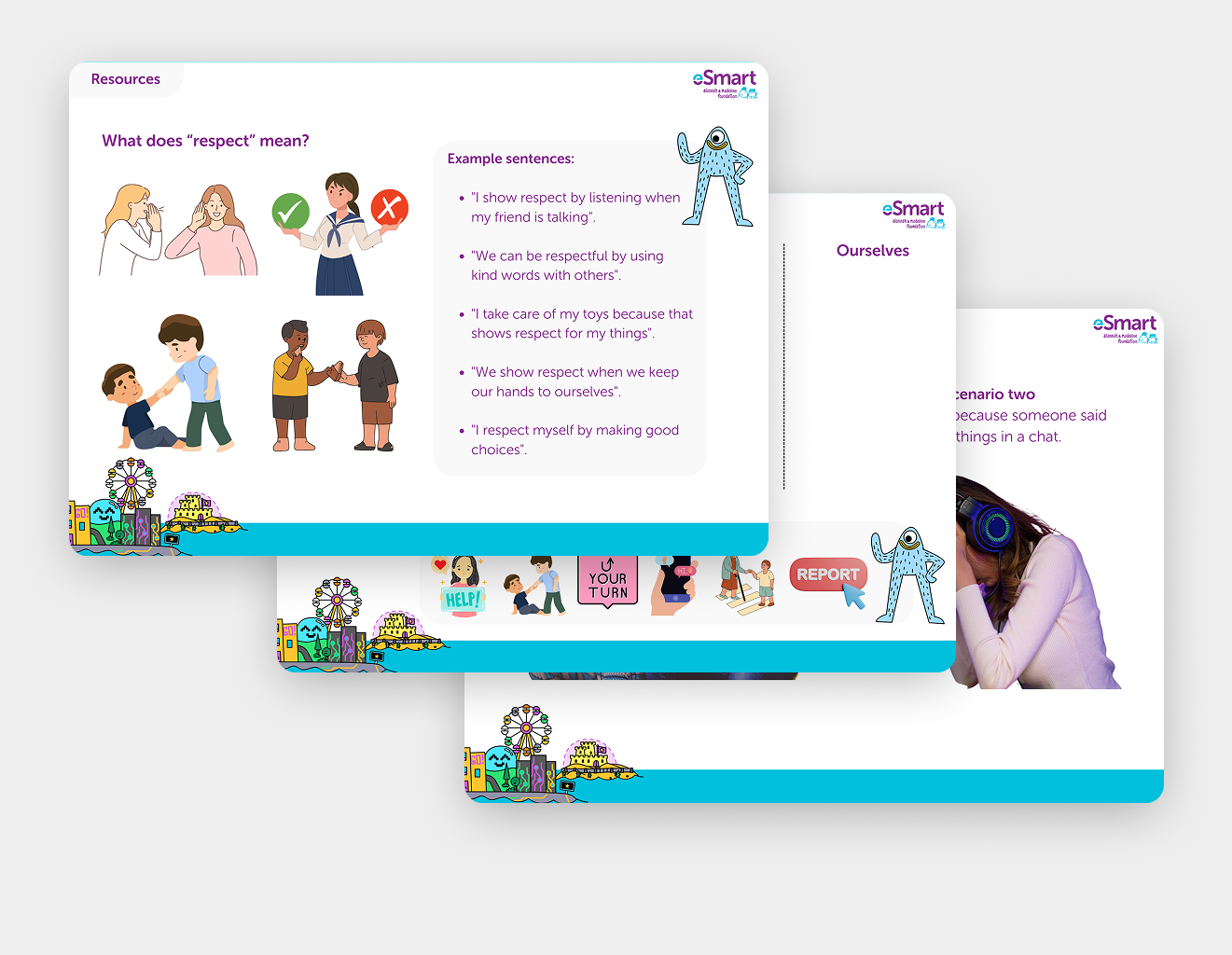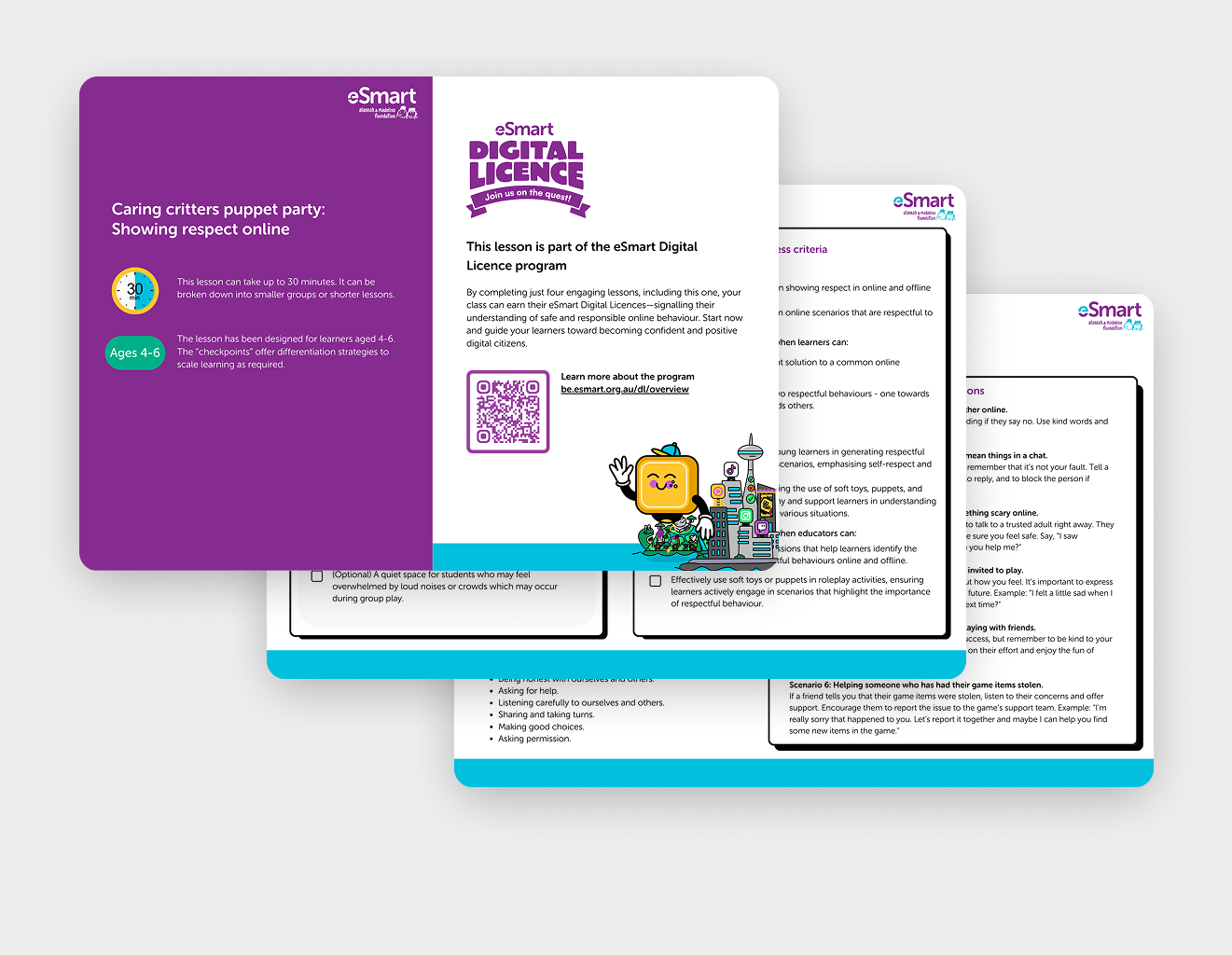Download Lesson Pack
Caring Critters Puppet Party: Showing Respect Online

Child Safeguarding Statement
Some resources and activities may prompt a child to remember and potentially share an experience of harm. Make sure you’re familiar with your school's safeguarding policies and procedures so you can confidently report safety and well-being concerns.
Prepare students for the session by discussing: their right to be safe and respected; what to do if discussing online safety makes them feel uncomfortable or unsafe; and how to seek help if they feel or have felt unsafe. Use this resource available on the website.
Caring Critters Puppet Party: Showing Respect Online
Students use soft toys, storytelling, and crafts to explore online kindness, fostering empathy and respectful behaviour in digital interactions.
Lesson details
Conduct
About this Risk Area
The behaviour children and young people engage in online.
Example topics:
- Cyberbullying awareness and prevention strategies.
- Practicing kindness, empathy, and respectful communication online.
- Understanding the consequences of digital actions, including what can be deleted and what cannot be deleted.
- Respecting online community guidelines and fostering a positive online environment.
The resources for this risk area guide positive online behaviours, by promoting kindness, respect, and responsible digital citizenship.
This lesson aims to teach young learners about the importance of respectful behaviours online and offline. Through the use of soft toys/puppets to facilitate roleplay, it addresses common online scenarios that require learners to show respect to themselves and others.
It unpacks what respect looks like both online and offline, emphasising the similarities in behaviours rather than viewing them as disconnected. Learners are encouraged to consider what self-respect entails, including saying no, reporting issues, or asking an adult for help.
Learning Intentions
Learners will:
- Explore the similarities between showing respect in online and offline environments.
- Generate solutions to common online scenarios that are respectful to themselves and others.
These intentions are evidenced when learners can:
- Suggest at least one relevant solution to a common online scenario that is respectful.
- Correctly identify at least two respectful behaviours - one towards themselves, and one towards others.
Educators will:
- Develop strategies to guide young learners in generating respectful solutions to common online scenarios, emphasising self-respect and respect for others.
- Develop practical skills regarding the use of soft toys, puppets, and roleplay to encourage empathy and support learners in understanding how to behave respectfully in various situations.
These intentions are evidenced when educators can:
- Successfully facilitate discussions that help learners identify the similarities between respectful behaviours online and offline.
- Effectively use soft toys or puppets in roleplay activities, ensuring learners actively engage in scenarios that highlight the importance of respectful behaviour.
Curriculum alignment
Australian Curriculum (Version 9.0)
The Australian Curriculum outlines the fundamental knowledge, comprehension, and abilities students are expected to acquire as they advance through the initial 11 years of schooling.
Foundation: General Capabilities
Personal and Social Capability
Empathy:
- Level 1: Demonstrate an awareness of the needs, emotions, cultures and backgrounds of others.
Foundation: Health and Physical Education
- AC9HPFP02: Practise personal and social skills to interact respectfully with others.
- AC9HPFP04: Explore how to seek, give or deny permission respectfully when sharing possessions or personal space.
- AC9ADRFD01: Use play, imagination, arts knowledge, processes and/or skills to discover possibilities and develop ideas.
- AC9ADRFC01: Create art works that communicate ideas.
- AC9ADRFP01: Share their art works with audiences.
Year One: General Capabilities
Personal and Social Capability
Relational Awareness:
- Level 2: Describe ways they can initiate and develop relationships, including identifying how others may feel in a range of contexts.
Year One: Health and Physical Education
- AC9HP2P02: Identify and explore skills and strategies to develop respectful relationships.
- AC9HP2P03: Identify how different situations influence emotional responses.
- AC9HP2P04: Practise strategies they can use when they need to seek, give or deny permission respectfully.
- AC9ADR2D01: Use the elements of drama and imagination in dramatic play and/or process drama.
- AC9ADR2C01: Create and co-create fictional situations based on imagination and/or experience.
- AC9ADR2P01: Share their drama in informal settings.
CASEL Framework
The CASEL Framework creates a foundation for applying evidence-based, Social and Emotional Learning (SEL) strategies both at school and in the broader community. Its aim is to support the cultivation of SEL skills and environments that advance students’ learning and development.
- Relationship skills: The abilities to establish and maintain healthy and supportive relationships and to effectively navigate settings with diverse individuals and groups.
My Time, Our Place – Framework for School Age Care in Australia
The aim of My Time, Our Place: Framework for School Age Care in Australia (the Framework) is to assist educators to provide children and young people with opportunities to maximise their potential and develop a foundation for successful lifelong learning. The Framework has been designed for use by approved providers and school age care educators working in partnership with children and young people, their families and the community, including schools.
Outcome 2: Children are connected with and contribute to their world.
Children develop a sense of belonging to groups and communities and an understanding of the reciprocal rights and responsibilities necessary for active community participation.
This is evident when children:
- Communicate and demonstrate an understanding that they are a part of a world that shares and communicates using digital technologies.
- Demonstrate an ability to share and respect others’ use of digital technologies.







.avif)
